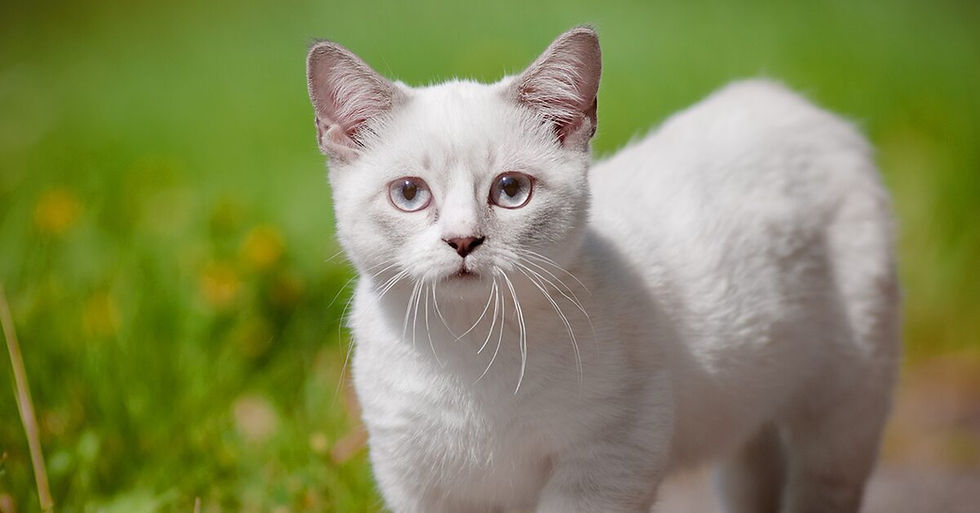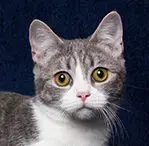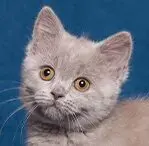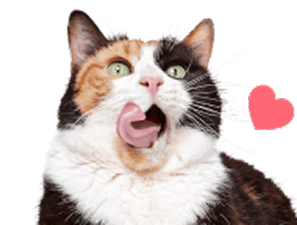
Meet the Munchkin Cat
Snuggle Buddy
Cutest Kitten
Pawpular Playmate
Looking for the Dachshund of the cat world? Look no further than the Munchkin cat breed: the pocket-sized kitten of your dreams. We may be one of the smallest cat breeds on the prowl with our short legs and only slightly longer bodies, but don’t let our size fool you! We have silly, fun-loving personalities; we love to play, and if we can’t hop up onto your lap on the first jump, we’ll keep trying until we figure it out. We can also stand perfectly on our hind legs to see you, which is very cute!
As for what kind of families we belong with, we’re the purrrfect sociable companion for just about anyone – as long as you keep us inside where we’re safe. It’s hard out in the backyard for us little ones! We’re curious cats, and love to hang out with you and your other pets. Introduce us to your friends and family, too, because we’ll play and snuggle with everyone. In fact, we’re so fun and friendly to be around, you’ll probably assume we’re kittens, even when we’re years into adulthood.
Ready to learn more about me? Let’s dig in.
Fun Loving
Curious
Friendly
About Me
Personality
Origin
United States
Group
Life Span
12-15 Years
CFA Breed Popularity
Length Range
11-14 Inches
Weight Range
5-9 Pounds

Black

White Tabby

Calico

Grey
My Many Looks
Playfulness
Pet Friendly
Kid-Friendly
Intelligence
Grooming Effort
Energy Level
Affection Level
Shedding
Health Issues
Chattiness
My Breed Characteristics
Wondering how we got our purrrfectly short leg length? We Munchkins are a breed of cat resulting from a spontaneous genetic mutation! All Munchkin cats possess a gene which causes the typically long bones in a cat’s legs to remain short. And while it’s a rare gene, it’s dominant, which means only one cat needs to have it in order to pass the trait along to their kittens!
Furbulous Fact
As you can see, we Munchkins age very gracefully. Here are a few key milestones in my growth & development to be aware of as I grow from a kitten, to an adult, to a senior!
Kitten
We Munchkin kittens are pretty tiny, so we have trouble reaching high places. You’ll want to keep us indoors and away from predators!
>5 years

Adult
I’m not big, but I sure am hairy! If I’m short-haired, brush my hair once a week. If I'm long-haired, brush me at least twice a week.
5-10 years

Senior
While I'm generally healthy, I am prone to genetic abnormalities of the spine and chest. Take me to the vet regularly for check ups!
10-15 years

As I Grow Up
History of My Breed
We Munchkins first developed our cute little legs in 1944 – or at least that's when we were first noticed in Great Britain. After that, cats with shorter legs were spotted again in Russia and New England. But it wasn’t until 1983, in Rayville, Louisiana, when our rare and autosomal dominant short-leg trait was noticed in a cat named Blackberry. She was discovered as a stray, and her litter became the first of the official Munchkin family.
From there, our cuteness spread as cat lovers began to breed more Munchkins. But when we debuted on a televised cat show in 1991, some critics and genetics committees became worried about us. Critics worry even today, as there are ethical concerns with breeding us to have such short legs. And if you do want to breed a Munchkin, you have to be well-versed in genetics. Breeding two Munchkins together will create a gene combination that can be lethal, as Munchkin cats cannot survive if they inherit the Munchkin gene from both parents. However, when one Munchkin cat mates with a long-legged cat who is free of the mutation, the mutation is dominant, resulting in an adorable litter of Munchkin kittens.
Because of all this controversy, some cat associations do not recognize us as a breed; we are still waiting for the two paws up sign from Cat Fanciers’ Association, but we are excited to be recognized by the International Cat Association as a breed of dwarf cat. But while there is debate amongst veterinarians about whether or not creating a cat with short legs and a long body is a good idea – similar to the "hot dog" dog breeds like the Dachshund and Corgi - nearly everyone is in agreement that us sausage cats are incredibly cute.
In addition to purebred Munchkins like me, there are tons of purrfectly sweet mixed-breed Munchkins that are looking to find their furever homes. You can learn where to find your next pet below!
Pawesome Cats to Parent
1
Purchase a Munchkin kitten from a breeder that tests breeding animals for heritable diseases, is transparent about test results, and gives you a health guarantee.
Because they are crossbred with Purebred cats, Munchkins tend to be relatively free of heritable disease. They are prone to lordosis (curvature of the spine) and pectus excavatum, which causes the ribs and sternum to form improperly, as well as any heritable diseases associated with purebred parents. Avoid heartbreak and veterinary expenses by purchasing kittens from responsible breeders who provide health guarantees.
2
Keep your Munchkin at a healthy weight to avoid problems associated with obesity, including osteoarthritis.
Due to their abnormally long backs and short, stumpy legs, Munchkin cats may be at higher risk for osteoarthritis. One way to minimize the symptoms of osteoarthritis and maintain mobility is to keep your cat at a healthy weight. Most adult Munchkin cats do not need to eat more than 250-300 kcals per day. Ask your veterinarian what your cat’s ideal weight is and how much to feed your cat per day to maintain that weight.
3
Have yearly blood tests run on older Munchkin cats to detect disease early.
Older Munchkin cats may be predisposed to hyperthyroidism, a condition seen in many cats that causes elevated levels of circulating thyroid hormone in the blood. Have your Munchkin’s bloodwork, including thyroid levels, checked yearly starting at age 7 to catch any problems early, including hyperthyroidism and kidney disease, both of which are seen in Munchkin cats.
About Me
While Munchkins are a generally healthy breed, cat-astrophes can happen to any cat at any age. If your kitty gets hurt or sick, pet insurance can help you say ‘yes’ to the best care, even when it’s costly. When it comes to shopping for this breed, you’ll want to choose insurance plans like Pumpkin's, which can help cover the costs associated with the hereditary conditions Munchkins are prone to developing. While a reputable breeder will conduct genetic testing on your kitty’s parents to help minimize the chances of passing down hereditary conditions, they can’t always be avoided. Let’s look at some common ones, and how Pumpkin Cat Insurance plans could help cover the cost of care!
Bladder Stones
Munchkins are prone to developing bladder stones – a urinary tract condition in which minerals build up and form stones that make urination extremely painful to impossible, depending on their size. While smaller stones can be removed via catheter, larger stones must be surgically removed.
Osteoarthritis
Munchkins are predisposed to osteoarthritis due to their shorter than average limbs. Signs of osteoarthritis tend to be very subtle in cats, though symptoms to look out for may include weight loss, change in attitude, change in grooming habits, and inability to jump on and off objects. Osteoarthritis is usually diagnosed by physical examination and radiographic evidence.
Periodontal Disease
This breed is prone to periodontal (gum) disease, which occurs when plaque builds up and forms a layer of tartar that inflames the gums. Left untreated, gums weaken and separate from teeth. While brushing, cleanings, and antibiotic gels help treat milder cases, severe ones may require surgery.
Spinal Problems and Chest Deformity
These deformities are caused when a cat’s muscles or bones grow incorrectly, which makes Munchkin kittens especially susceptible. “Lordosis” is a deformity of a cat’s lower spine, and “Pectus Excavatum” occurs when the ribs and sternum don’t grow properly. Keep an eye out for anything unusual.

Why Get Cat Insurance?
from Pumpkin®
*Example illustrates reimbursement of a covered vet bill at a 90% reimbursement rate, where the annual deductible had already been satisfied and the annual limit had not yet been met. Coverage and reimbursement results vary based on policy options.




